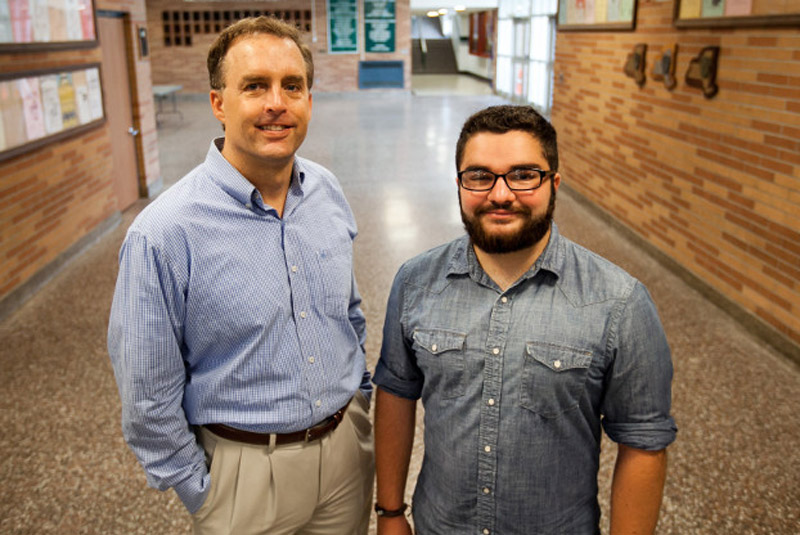Bjork's Ford Scholar Research: Getting Schooled on Education
Our public schools need to get better. Teachers must be held more accountable for how well, or how poorly, our children learn. And the best way to do that is to generate competition by creating charter schools and by administering more standardized tests to our students to measure how well teachers teach.

That was the thinking behind former President George W. Bush’s No Child Left Behind initiatives and President Obama’s Race to the Top programs. The reasoning seems sound enough, and it certainly appeals to many taxpayers, who believe our schools would produce better students if they were run more like a business.
But is the “corporatization of education” sound policy or is it seriously flawed? That’s the question Vassar education professor Chris Bjork and Ford Scholar Kyle DeAngelis ’15 are attempting to answer this summer. Bjork and DeAngelis are designing a senior seminar exploring American education policy that Bjork will teach this spring. And they say they’ve already found reasons to question current policies.
“President Bush predicted test scores would rise under No Child Left Behind, but more than a decade later, they haven’t,” Bjork says. “There’s a slight uptick in fourth grade math scores but very little improvement otherwise.”
DeAngelis, a psychology major from Barrington, RI, who will earn an elementary teaching certificate when he graduates, spent his first two weeks as a Ford Scholar reading analyses of federal education policy written by experts on both sides of the issue—advocates such as former Washington, DC, school chancellor Michelle Rhee and critics such as Diane Ravitch, a professor of education at New York University and a former U.S. Assistant Secretary of Education. “On paper, the theory behind No Child Left Behind makes some sense—making teachers more accountable through more assessments of what students are learning seems like a good idea,” DeAngelis says. “But if it doesn’t seem to be working, you have to start asking why.”
He says he recently read an account of an incident that occurred at a conference on education policy. The owner of a successful ice cream company was advocating running public schools the way he ran his business. During the question-and-answer period, a teacher asked the business owner what he did if he discovered an imperfect batch of blueberries had been delivered to the factory that made his blueberry ice cream. The man replied he’d send them back. “That’s when the teacher pointed out, ‘We can’t send our students back,’ ” DeAngelis said.
The question that teacher raised helps explain why some charter schools appear to be helping their students succeed more readily than traditional public schools, Bjork says. “Many students from poor households and bad family backgrounds have emotional or learning disabilities that have to be addressed, but charter schools often don’t take these types of kids,” he says. “When you adjust the statistics for that, there’s little or no difference in the performance of charter schools and traditional public schools.”
DeAngelis and Bjork say the emphasis on standardized testing has led to the elimination of subjects that aren’t conducive to such testing, such as music and art, in some financially strapped schools. Such cutbacks and the growing concern about the effectiveness of standardized testing are causing experts in the field, and many parents and students, to question the effectiveness of No Child Left Behind and Race to the Top. “This is not a Democrat vs. Republican issue—both Bush and Obama have endorsed it,” Bjork says. “But there’s an emerging opposition—people are saying maybe we should try a different approach.”
Last year, DeAngelis says, some high school students in Rhode Island staged a protest against the state’s emphasis on standardized testing by showing up in zombie costumes at the headquarters of the state’s Department of Education. The students noted that if they failed to graduate because they didn’t do well enough on the tests, they’d be “dead to society.”
Bjork says he will present both sides of the issue in his seminar and let his students arrive at their own conclusions about the viability of federal education policy. ”Whatever they decide, I want them to be armed with the facts,” he says.
DeAngelis says he’s grateful for the opportunity as a Ford Scholar to explore national education policy as he prepares to enter a public school classroom himself in 2016. He says his experience as a volunteer at the Wimpfheimer Nursery School on the Vassar campus and as a tutor at Poughkeepsie Middle School taught him that providing a good education is not a one-size-fits-all business. “I saw the disparity between educating children of privilege and support and children without it, just a few blocks away,” he says.
All the flaws in the system notwithstanding, DeAngelis says he’s eager to launch his teaching career. “There’s a lot about the system that needs to be improved,” he says, “but once you get the education bug, you can’t shake it.”
©Vassar College-Buck Lewis
